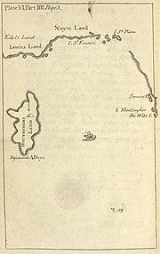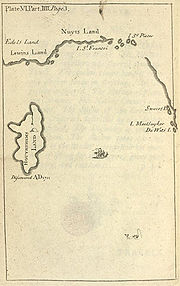
Houyhnhnm
Encyclopedia

Jonathan Swift
Jonathan Swift was an Irish satirist, essayist, political pamphleteer , poet and cleric who became Dean of St...
's satirical Gulliver's Travels
Gulliver's Travels
Travels into Several Remote Nations of the World, in Four Parts. By Lemuel Gulliver, First a Surgeon, and then a Captain of Several Ships, better known simply as Gulliver's Travels , is a novel by Anglo-Irish writer and clergyman Jonathan Swift that is both a satire on human nature and a parody of...
. The name is pronounced either ˈhuːɪnəm or /ˈhwɪnəm/.
Houyhnhnms contrast strongly with the Yahoos
Yahoo (literature)
A Yahoo is a legendary being in the novel Gulliver's Travels by Jonathan Swift.Swift describes the Yahoos as vile and savage creatures, filthy and with unpleasant habits, resembling human beings far too closely for the liking of protagonist Lemuel Gulliver, who finds the calm and rational society...
, savage humanoid
Humanoid
A humanoid is something that has an appearance resembling a human being. The term first appeared in 1912 to refer to fossils which were morphologically similar to, but not identical with, those of the human skeleton. Although this usage was common in the sciences for much of the 20th century, it...
creatures: whereas the Yahoos represent all that is bad about humans, Houyhnhnms have a stable, calm, reliable and rational society. Gulliver much prefers the Houyhnhnms' company to the Yahoos', even though the latter are biologically closer to him.
Interpretation of the Houyhnhnms has been vexatious. It is possible, for example, to regard them as a veiled criticism by Swift of the British Empire
British Empire
The British Empire comprised the dominions, colonies, protectorates, mandates and other territories ruled or administered by the United Kingdom. It originated with the overseas colonies and trading posts established by England in the late 16th and early 17th centuries. At its height, it was the...
's treatment of non-whites as lesser humans, and it is similarly possible to regard Gulliver's preference (and immediate division of Houyhnhnms into color-based hierarchies) as absurd and the sign of his self-deception. In a modern context it can be seen as presenting an early example of animal rights
Animal rights
Animal rights, also known as animal liberation, is the idea that the most basic interests of non-human animals should be afforded the same consideration as the similar interests of human beings...
concerns, especially in Gulliver's account of how horses are cruelly treated in his society and the reversal of roles, and a possible inspiration for Pierre Boulle
Pierre Boulle
Pierre Boulle was a French novelist largely known for two famous works, The Bridge over the River Kwai and Planet of the Apes .-Biography:...
's novel Planet of the Apes.
Book IV of Gulliver's Travels is the keystone, in some ways, of the entire work, and critics have traditionally responded to the subject of whether Gulliver is insane (and therefore just another victim of Swift's satire) or not by questioning whether or not the Houyhnhnms are truly admirable. Gulliver loves the land and is obedient to a race that is not like his own. The Houyhnhnm society is based upon reason, and only upon reason
Logic
In philosophy, Logic is the formal systematic study of the principles of valid inference and correct reasoning. Logic is used in most intellectual activities, but is studied primarily in the disciplines of philosophy, mathematics, semantics, and computer science...
, and therefore the horses practice eugenics
Eugenics
Eugenics is the "applied science or the bio-social movement which advocates the use of practices aimed at improving the genetic composition of a population", usually referring to human populations. The origins of the concept of eugenics began with certain interpretations of Mendelian inheritance,...
based on their analyses of benefit and cost. They have no religion and their sole morality is the defense of reason, and therefore they are not particularly moved by pity or a belief in the intrinsic value of life. Gulliver himself, in their company, builds the sails of his skiff from "Yahoo skins." Examples of the Houyhnhnms' lack of passion surface mainly during their annual meeting. A visitor apologizes for being late to the meeting as her husband had died shortly before and she had to make the proper arrangements for the funeral, which consists in burial at sea. She eats her lunch like all other Houyhnhnms and is not affected at all by her loss, rationalizing that gone is gone. A further example of the lack of humanity and emotion in the Houyhnhnms is that their laws demand that each couple produce two children, one male and one female. In the event that a marriage produced two offspring of the same sex, the parents would take their children to the annual meeting and trade them with a couple who produced two children of the opposite sex. This latter part was viewed by some Swift scholars as his spoofing and or criticizing the notion that the "ideal" family produces children of both sexes.
On the one hand, the Houyhnhnms have an orderly and peaceful society. They possess philosophy
Philosophy
Philosophy is the study of general and fundamental problems, such as those connected with existence, knowledge, values, reason, mind, and language. Philosophy is distinguished from other ways of addressing such problems by its critical, generally systematic approach and its reliance on rational...
and have a language that is entirely pure of political and ethical nonsense. They possess, for example, no word for a lie (and must substitute a phrase — to say a thing which is not). They also have a form of art that is derived from nature. Outside of Gulliver's Travels, Swift had expressed longstanding concern over the corruption of the English language
English language
English is a West Germanic language that arose in the Anglo-Saxon kingdoms of England and spread into what was to become south-east Scotland under the influence of the Anglian medieval kingdom of Northumbria...
, and he had proposed language reform. He had also, in Battle of the Books and in general in A Tale of a Tub
A Tale of a Tub
A Tale of a Tub was the first major work written by Jonathan Swift, composed between 1694 and 1697 and published in 1704. It is arguably his most difficult satire, and perhaps his most masterly...
, expressed a preference for the Ancients (Classical authors) because their art was based directly upon nature, and not upon other art.
On the other hand, Swift was profoundly mistrustful of attempts at reason that resulted in either hubris
Hubris
Hubris , also hybris, means extreme haughtiness, pride or arrogance. Hubris often indicates a loss of contact with reality and an overestimation of one's own competence or capabilities, especially when the person exhibiting it is in a position of power....
(for example, the Projectors satirized in A Tale of a Tub or in Book III of Gulliver's Travels) or immorality (such as the speaker of A Modest Proposal
A Modest Proposal
A Modest Proposal for Preventing the Children of Poor People in Ireland From Being a Burden on Their Parents or Country, and for Making Them Beneficial to the Publick, commonly referred to as A Modest Proposal, is a Juvenalian satirical essay written and published anonymously by Jonathan Swift in...
, who offers an entirely logical and wholly immoral proposal for cannibalism
Cannibalism
Cannibalism is the act or practice of humans eating the flesh of other human beings. It is also called anthropophagy...
). The Houyhnhnms embody both the good and the bad side of reason, for they have the pure language Swift wished for and the immorally rational approach to solving the problems of humanity (Yahoos); the extirpation of the Yahoo population by the horses is very like the speaker of A Modest Proposal.
After Gulliver makes it out to the shipping lanes he is rescued by a Portuguese sea captain
Pedro de Mendez
Pedro de Mendez is the name of the Portuguese captain who rescues Lemuel Gulliver in Book IV of Jonathan Swift’s Gulliver’s Travels. When Gulliver is forced to leave the Island of the Houyhnhnms, his plan is "to discover some small Island uninhabited" where he can live in solitude. Instead, he is...
, a level-headed individual albeit full of concern for others. The captain's temperament was considered the perfect medium between that of the Houyhnhnms and the Yahoos, and Gulliver had remembered that he was the man he had gotten along best with. When Gulliver returns to England at the end of Gulliver's Travels, he finds the smell and look of his countrymen intolerable. He regards all around him as Yahoos, and he spends much of his time in the stables near his horses, with whom he converses, although he did say he has a friendship with the stable boy owing to his love of horses.
See also
- BrobdingnagBrobdingnagBrobdingnag is a fictional land in Jonathan Swift's satirical novel Gulliver's Travels occupied by giants. Lemuel Gulliver visits the land after the ship on which he is travelling is blown off course and he is separated from a party exploring the unknown land.The adjective Brobdingnagian has come...
- Lilliput and BlefuscuLilliput and BlefuscuLilliput and Blefuscu are two fictional island nations that appear in the first part of the 1726 novel Gulliver's Travels by Jonathan Swift. The two islands are neighbors in the South Indian Ocean, separated by a channel eight hundred yards wide. Both are inhabited by tiny people who are about...
- StruldbrugStruldbrugIn Jonathan Swift's novel Gulliver's Travels, the name struldbrug is given to those humans in the nation of Luggnagg who are born seemingly normal, but are in fact immortal. However, although struldbrugs do not die, they do nonetheless continue aging...
- Yahoo (Gulliver's Travels)

